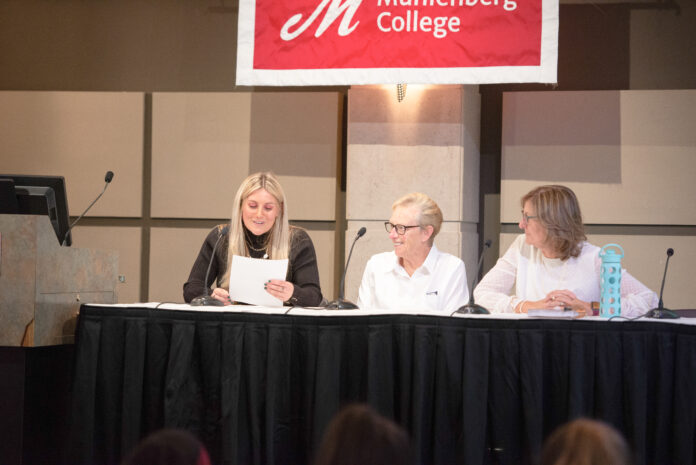
In Moyer Hall’s Miller Forum on Tuesday, Nov. 16, softball star Genna Cicchetti ‘22 presented her research in celebration of the 50th anniversary of Title IX at Muhlenberg in front of a room filled with fellow teammates and family.
Initially, Title IX was passed into law in 1972, along with a series of other education reform bills, which prohibited discrimination based on sex in educational institutions that receive federal funding.
“The topic of Title IX is something that not a lot of people think to address unless a situation happens to them directly,” said teammate Kaitlyn Buurman ‘25. “So I think it was important that she shed light on the fact that it’s an issue that everyone should be educated on and that it happens to student-athletes around us.”
Another one of Cicchetti’s teammates, Sarah Karmazyn ‘22, attended the event. Karmazyn had immense praise for her teammate, “Being able to watch my fellow teammate and friend bring light to such an important part about the history of athletics was amazing. She provided a panel of notable representatives that could provide their own personal experiences while also speaking heavily on the topic.”
Standing before the room and next to legendary former softball coach Ruth Gibbs and Athletic Director Lynn Tubman, Cicchetti unveiled the findings of the archival work she had been doing in the depths of the Trexler Memorial Library, which was part of her collaborative internship with the athletic department and ‘Berg’s political science department.
“The people that she [Cicchetti] brought in to talk on the panel had a very interesting perspective on it, and it gave you more insight into how Title IX really affects people without just hearing stories but by reading them, you actually heard them from real people who went through the changes caused by Title IX things today,” said Buurman.
Becoming interested in the facets of Title IX, and as one of Muhlenberg’s premier female athletes, Cicchetti was eager to “put together an event that celebrated and shared some of the history of women at Muhlenberg and how hard women continuously have to fight to ensure that they get the same opportunities as men.”
Initially advised by Lanethea Mathews-Schultz, Ph.D., department chair and professor of political science, to pursue a line of archival-based research in the library, Cicchetti was introduced to Special Collections & Archives Librarian Susan Falciani Maldonado. At that point, Maldonado provided Cicchetti with boxes of records pertaining to the history of Title IX at the College.
After countless hours of digging through the records, Cicchetti uncovered an abundance of essential information. In addition to internship advisor Mathews-Schultz and Associate Athletic Director Megan Patruno, who helped organize the event, Cicchetti was guided by two fundamental questions: (1) What did Title IX actually do for women? and (2) What did Muhlenberg do for women immediately following the law’s passing?
Cicchetti brought to light that Muhlenberg proved to be slow in making equal opportunities available for both sexes on the court and field. In 1973-1974, ‘Berg men had 11 collegiate sports while the women had only three extracurricular teams, with practices taking place in Brown Hall. These teams included tennis, basketball and field hockey.
It wasn’t until the president of the College, John H. Morey, established the Women’s Task Force in 1974 that the College began to embrace the fight for equality. In fact, the 1982-1983 school year, the 25th anniversary of Muhlenberg becoming co-educational, was dubbed the “Year of the Muhlenberg Woman.”
Cicchetti also interviewed Connie Kunda, who joined Muhlenberg in 1966 and served as the associate director of athletics during her illustrious 34-year tenure at ‘Berg.
Engaging in this type of archival research, along with getting to know Kunda and Gibbs, Cicchetti learned a lot along the way. “Doing research and having such amazing women that allowed me to interview them and participate in my panel was truly a humbling experience for me. I was able to learn so many of the ins and outs of what they had to do to be in their positions,” Cicchetti said.
However, she admits that gathering all of the necessary documents was the “trickiest part.”
“It was [just] very time consuming, conducting interviews, digging through archives, deciding how I was going to present the information. I realized that by doing this project alone I am truly capable of so much more than I thought I was,” she said.
Cicchetti’s work culminated with an incredible turnout and a level of support she could not have imagined. In fact, her work proved to be insightful for members of the audience as well. For Jarred Ford ‘22, a pole vaulter on the men’s track and field team, the event was eye-opening.
“It revealed that our institution struggled with anti-discrimination policies prior to Title IX. But, ever since its establishment, they [Muhlenberg College] have been making strides to be more inclusive among women in sports,” he said
Given the evident success and impact of her first event, Cicchetti already has plans for future ones.
Her new research focus is on the recent changes to NCAA rules implementing NIL (Name Image Likeness), allowing student-athletes to financially benefit from themselves in a multitude of facets. “My next project is going to be working alongside members from the athletics department to create Name, Image, and Likeness rules for Muhlenberg. Since I am looking to go to law school next year, this component of Sports and Title IX laws has emerged as a passion of mine and I think I am going to pursue it as my career,” Cicchetti said.
Alex Blum '22 graduated with a degree in Media & Communication and English.





















